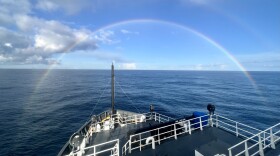-
A growing technology is helping scientists save time and effort when they study rare critters and vast places.
-
The Bell M. Shimada is designed to gather scientific information. But the collaborative effort of the crew and officers makes scientific endeavors at sea possible.
-
One single-celled oceanic organism could provide big answers to questions about climate change.
-
Phytoplankton make up an extremely important part of the ocean’s food chain, serving as food for organisms that feed young salmon and other fish in the ocean.
-
Scientists aboard the Bell M. Shimada keep an eye out for whales. One scientist hopes to help predict where whales will show up by studying the food they eat.
-
At least twice a year, a team of scientists on NOAA's research vessel Bell M. Shimada survey waters along the Washington and Oregon coast.
-
The place where salmon spend most of their lives also is the place scientists know the least about: the ocean.







